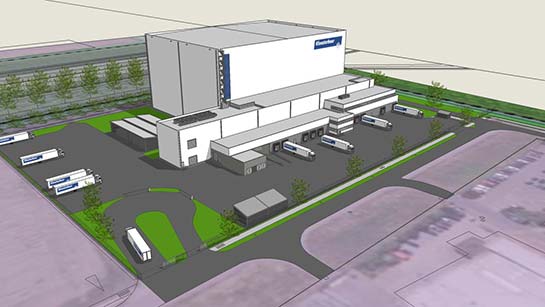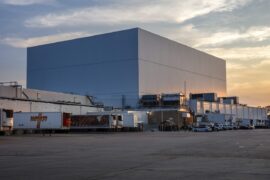International logistics service provider Kloosterboer has announced that it will build a fully automated high-bay coldstore featuring 40,000 pallet positions in the central Netherlands municipality of Lelystad. The primary customer for the multi-client refrigerated warehouse will be frozen potato products producer McCain Foods.
The new facility will be situated on a 2.6-hectare site and is scheduled to be operational by the fourth quarter of 2018. Its engineering design and state-of-the-art equipment will require 50% less energy than a conventional coldstore to run, which is equivalent to a reduction of 1,551 tons of CO2 per year.

Kloosterboer is already an integrated supply chain partner for McCain Foods in Harnes, France, and in Maasvlakte Rotterdam and Vlissingen, Netherlands. Further centralizing logistics services for McCain in the Northern Europe market reduces road traffic by about 6,000 transports and 420,000 kilometers.
Lelystad is strategically placed for locating the new facility. Not only is it near an existing McCain production plant in the Oostervaart-Oost industrial area, but it is also well positioned for distribution of finished products further into Europe.
“We are very proud to be creating a second distribution center with our partner McCain in order to optimize their supply chain strategy,” said Stephane Pluenet, chief operating officer of Kloosterboer.
The cold storage company and the municipality of Lelystad have been working closely and expeditiously on preparations necessary to make this project a reality. Indeed, the environmental permit has already been granted.
According to Jop Fackeldey, Lelystad’s alderman for economic affairs, Kloosterboer’s move to the community marks confirmation of the city’s status as a “logistics hot spot” in the Netherlands.
“Accessibility is key to economic success,” said Fackeldey. “The widening of the A6 motorway, the expansion of Lelystad Airport, the construction of Flevokust Haven, the good connections to the rail network and the good urban facilities make Lelystad an ideal location for companies that depend on good connections and access to transport networks. Kloosterboer, McCain and Lelystad are a great combination.”
Widening Global Network
 Kloosterboer, which now ranks as the largest provider of temperature controlled logistics in Europe, has 16 branches operating in the Netherlands, France, Sweden, Germany, South Africa, Canada and the United States. In total, the company offers over 3,500,000 cubic meters of storage space where more than 500,000 tons of food and non-foodstuffs may be stored during peak periods.
Kloosterboer, which now ranks as the largest provider of temperature controlled logistics in Europe, has 16 branches operating in the Netherlands, France, Sweden, Germany, South Africa, Canada and the United States. In total, the company offers over 3,500,000 cubic meters of storage space where more than 500,000 tons of food and non-foodstuffs may be stored during peak periods.
Last December Kloosterboer acquired a 51% stake in the Bremerhavener Cold Store in Germany, a unit of BLG Logistics Group AG & Co. KG. In February, after receiving a green light from cartel authorities, activities within the German market commenced under the name Kloosterboer BLG Coldstore GmbH.
In collaboration with BLG Logistics, operations are carried out in Bremerhaven’s container terminal with present capacity of 29,000 pallets. Planned construction of an additional refrigerated warehouse facility in Bremerhaven’s Fischereihafen, also to be run by Kloosterboer BLG Coldstore GmbH, will represent further expansion of the Group’s operations and activities in Germany. It is scheduled to open during for the first half of 2018.
Meanwhile, in May the company officially inaugurated a new site in Rotterdam that is doing business as Kloosterboer Cool Port and has storage capacity for 40,000 pallets, of which 30,000 are dedicated to cold storage and 10,000 to deep-freeze storage. On the ground floor there is a 7,500-square-meter expedition area featuring 38 dock shelters, while the first floor sports a packing/unpacking facility designed specifically for the handling of fruit and vegetables. It is equipped with ripening rooms as well.
“The Cool Port project provides an innovative logistics solution which incorporates barging, automated process management and information provision within the supply chain,” said CEO Jaco Hooij. “Even before the doors were opened, 80% of the storage space had already been reserved, resulting in the need for and reality of Cool Port II growing one step closer.”





